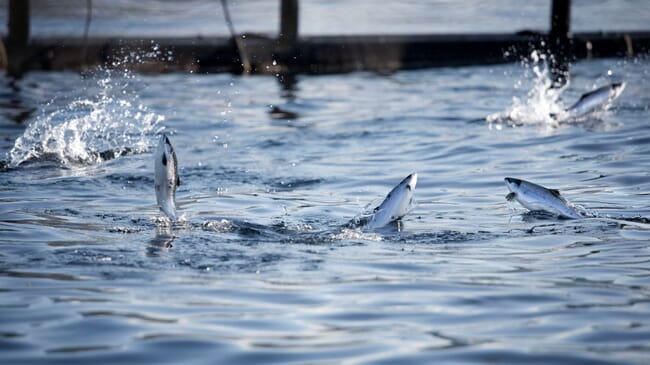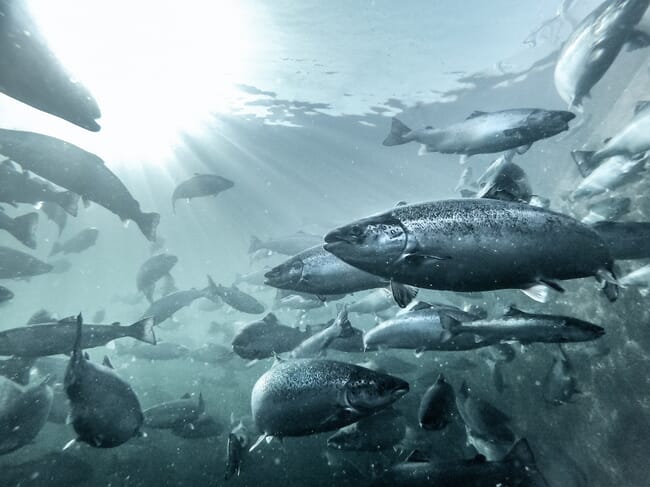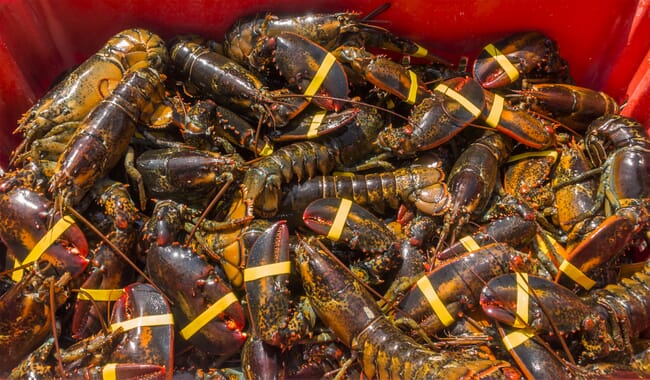
The DFO report outlined the potential impacts the expansion would have on lobster and wild salmon © Cermaq
Canada’s Department of Fisheries and Oceans has released its review of a Cooke Aquaculture’s proposed salmon farm expansion in Liverpool Bay, Nova Scotia. The report outlined the potential impacts on lobster and wild salmon – with the department opting to neither approve nor reject the expansion, saying that they will wait for conclusions of a hearing with provincial regulators.
Cooke, through its subsidiary Kelly Cove Salmon, wants to increase the size of its existing fish farm at Coffin Island in Liverpool Bay and add two more sites nearby at Mersey Point and Brooklyn. If approved, production from each site would be 660,000 salmon — a 370 percent increase in the number of farmed fish in the bay, according to the DFO report.
The DFO report focused on the risks of environmental residues from medicinal treatments and aqua-focused pharmaceuticals. Researchers explored the impact of those materials on the seabed, the potential for wildlife entanglements, the effect on wile salmon population and the cumulative effect that the expanded production would have on human activities in Liverpool Bay.

Cooke does not use approved pest-control products, including hydrogen peroxide and azamethiphos, at its site © Aker Biomarine
The report notes Cooke does not use approved pest-control products, including hydrogen peroxide and azamethiphos, in the bay. It also notes the company has not had a reported escape since Cooke took over the lease in 2010. Cooke also says that there are no current issues with sea lice at the Liverpool Bay site.
The report parameters
The DFO report assesses the risk of chemicals – regardless of whether they are used during production. Their analysis found that the local seabed (within a 3.8 km radius) could be exposed to in-feed pharmaceuticals from fish waste if the drugs were deployed. They also concluded that some medicinal treatments could have an impact radius of 4.3 kilometres. This suggests that any deployment of chemicals would pose a threat to the local lobster fishery.
However, the report notes that the use of azamethiphos – a sea lice treatment – will likely be restricted between the months of November and May to avoid interfering with lobster populations. DFO said low oxygen levels caused by smothering sediment have occurred at the current site. But it says exposures to waste feed and other smothering material may be transient because the seabed is periodically reset by waves and storms.
The report states that the site expansion would bring, “a high potential for cumulative effects on water and sediment quality, particularly impacting benthic habitats and associated species.” The proposed expansion would also increase the probability of fish escapes – a recurring pain point for conservationists.
Cooke spokesperson Joel Richardson said the company just received the DFO document and has begun a review.
"The items raised by DFO appear to all be already addressed within Kelly Cove Salmon's technical and scientific application document to the Nova Scotia Department of Fisheries and Aquaculture," Richardson said in a statement. He disputed a risk identified by DFO that "the proposed increase in total leased area may result in lobster being inaccessible to the traditional lobster fishery in Liverpool Bay." Richardson said the inshore lobster fishery and its salmon farms co-exist.

"We allow lobster fishers to come into our lease areas to set traps and they have great success in every location where we operate including at our existing Coffin Island farm in Liverpool Bay."
As of publication, the expansion is still in limbo – the DFO has neither approved nor rejected the license. The department said they would wait for the outcome of a hearing with regulators in Nova Scotia.




